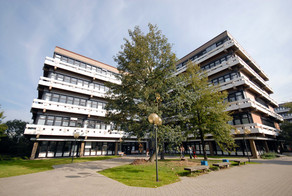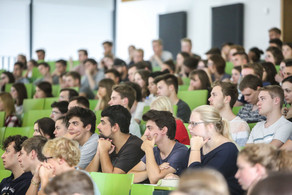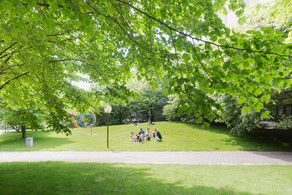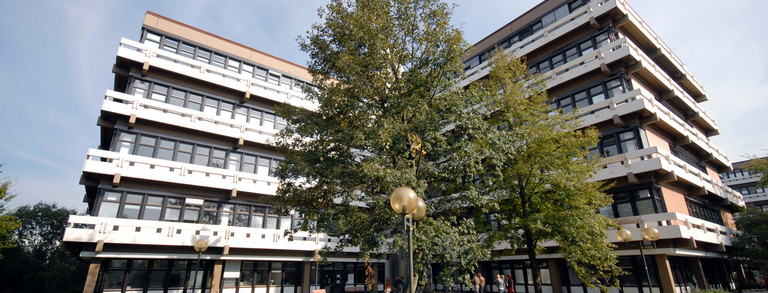Dr. Linda Wirthwein
Focus of work
- Subjective well-being of children and adolescents
- Motivational determinants of school performance, especially goal orientations
- Intellectual giftedness in the context of inclusion
- Psychology teaching in general education schools
Office hours
Consultation hours are currently held by phone or by Zoom. To register, please email me with your concerns and we will schedule an appointment.
The next office hours to sign off on experimental subject hours will be on 10/21 and 11/4 at 12pm (room 2.329). Please be sure to sign up in advance via email.
More information
2019-2021 Fellowship within the Global Young Faculty (funded by MERCUR, Stiftung Mercator and UA Ruhr; www.global-young-faculty.de)
Since 10/2017 Head of the BMBF-funded project "Children of Mentally Ill Parents at Risk Evaluation" (COMPARE), subproject COMPARE-school.
10/2016 Rejected call for a temporary junior professorship in child and adolescent psychology in an educational context at TU Dortmund University and accepted a permanent academic council position at TU Dortmund University, Institute of Psychology.
Academic council of the Institute of Psychology
10/2016 Call to a temporary junior professorship for child and adolescent psychology in an educational context at TU Dortmund University.
05/2015 - 03/2016 Maternity leave/parental leave
10/2012 - 09/2016 Temporary academic councilor AG Educational and Differential Psychology (Prof. Dr. Steinmayr) TU Dortmund
Student advisor of the Institute of Psychology
12/2011 - 09/2012 Temporary Academic Adv isor Educational Psychology (Prof. Dr. Steinmayr) Philipps-Universität Marburg
Staff member at the Talent Diagnostic Counseling Center BRAIN
07/2010 Disputation Title: "More luck than brains? On the well-being of highly gifted people".
07/2006 - 11/2011 Research Assistant Educational Psychology (Prof. Dr. Rost) Philipps-University Marburg
Staff member of the Talent Diagnostic Counseling Center BRAIN
12/2005 - 06/2006 Research Assistant at the Talent Diagnostic Counseling Center BRAIN
11/2005 Diploma in Psychology ( with distinction) Philipps University Marburg
- Subjective (school) well-being of children and adolescents
- Motivational determinants of school performance, especially goal orientations
- Intellectual giftedness in the context of inclusion
Articles in journals with peer review system
- Mächel, L., Steinmayr, R., Christiansen, H., & Wirthwein, L. (accepted). On the Association between Students' (Domain-Specific) Subjective Well-being and Academic Achievement - Disentangling Mixed Findings. Current Psychology.
- Steinmayr, R., Paschke, P., & Wirthwein, L. (2022). elementary school students' Subjective Well-Being Before and During the COVID-19 Pandemic: A Longitudinal Study. Journal of HappinessStudies, 23, 2985-3005. https://doi.org/10.1007/s10902-022-00537-y
- Frank, B.P., Theil, C.M., Brill, N.,Christiansen, H., Schwenck, C., Kieser, M., Reck, C., Steinmayr, R., Wirthwein, L. & Otto, K. (2022). Leave me alone with your symptoms! Social exclusion at the workplace mediates the relationship of employee's mental illness and sick leave. Frontiers in Public Health. doi.org/10.3389/fpubh.2022.892174
- Schwinger, M. Trautner, M., Pütz, N., Fabianek, S. Lemmer, G., Lauermann, F., & Wirthwein, L. (2021). Why do students use strategies that hurt their chances of academic success? A meta-analysis of antecedents of academic self-handicapping. Journal of Educational Psychology. 114(3), 576-596. https://doi.org/10.1037/edu0000706
- Wirthwein, L. & Steinmayr, R. (2020). Performance-approach goals: The operationalization makes the difference. European Journal of Psychology of Education (2020). doi. org/10.1007/s10212-020-00520-2
- Bergold, S., Wirthwein, L. & Steinmayr, R. (2020). Similarities and differences between intellectually gifted and average-ability students in school performance, motivation, and subjective well-being. Gifted Child Quarterly, 64, 285-303. https://doi.org/10.1177/0016986220932533
- Wirthwein, L., Sparfeldt, J.R., Heyder, A., Buch, S.R., Rost, D.H. & Steinmayr, R. (2020). Sex differences in achievement goals: Do school subjects matter? European Journal of Psychology of Education, 35, 403-427. https://doi.org/10.1007/s10212-020-00520-2
- Steinmayr, R., Wirthwein, L., Modler, L., & Barry, M.M. (2019). Development of subjective-well being in adolescence. International Journal of Environmental Research and Public Health, 16, 3690. https://doi.org/10.3390/ijerph16193690
- Wirthwein, L., Bergold, S., Preckel, F. & Steinmayr, R. (2019). Personality and school functioning of intellectually gifted and nongifted adolescents: self-perceptions and parents' assessments. Learning and Individual Differences, 73, 16-29. https://doi. org/10.1016/j.lindif.2019.04.003
- Christiansen, H., Reck, C., Zietlow, A., Otto, K., Steinmayr, R., Wirthwein, L., Weigelt, S., Stark, R., Ebert, D., Buntrock, C., Krisam, J., Klose, C., Kieser, M. & Schwenck, C. (2019). Children of mentally ill parents at risk evaluation (COMPARE): design and methods of a randomized controlled multicenter study - part I. Frontiers in Psychiatry 10:128 https://doi:10.3389/fpsyt.2019.00128
- Crede, J., Wirthwein, L., Steinmayr, R. & Bergold, S. (2019). Students with special educational needs in emotional and social development and their peers in collaborative learning: differences in self-concept, classroom climate, and social integration. Journal of Educational Psychology, 33, 207-221. https://doi. org/10.1024/1010-0652/a000244
- Steinmayr, R., Naumburg, C., Michels, J., Heyder, A. & Wirthwein, L. (2018). School-related and individual predictors of subjective well-being and academic achievement. Frontiers in Psychology, 9:2631. doi: 10.3389/fpsyg.2018.02631
- Bergold, S., Wirthwein, L., Rost, D.H., & Steinmayr, R. (2017). What happens if the same curriculum is taught in five instead of six years? A quasi-experimental investigation of the effect of schooling on intelligence. Cognitive Development, 44, 98-109.
- Steinmayr, R., Crede, J., McElvany, N., & Wirthwein, L. (2016). Subjective well-being, test anxiety, academic achievement: Testing for reciprocal effects. Frontiers in Psychology, 6:1994.
- Crede, J., Wirthwein, L., McElvany, N., & Steinmayr, R. (2015). Adolescents' academic achievement and life satisfaction: The role of parents' education. Frontiers in Psychology, 6:52.
- Bergold, S., Wirthwein, L., Rost, D.H. & Steinmayr, R. (2015). Are gifted adolescents more satisfied with their lives than their non-gifted peers? Frontiers in Psychology, 6:1623.
- Dinger, F.C., Dickhäuser, O., Hilbig, B.E., Müller, E., Steinmayr, R., & Wirthwein, L. (2015). From basic personality to motivation: Relating the HEXACO factors to achievement goals. Learning and Individual Differences, 40, 1-8.
- Sparfeldt, J.R., Brunnemann, N., Wirthwein, L., Buch, S.R., Schult, J., & Rost, D.H. (2015). General versus specific achievement goals: A re-examination. Learning and Individual Differences, 43, 170-177.
- Steinmayr, R., Wirthwein, L., & Schöne, C. (2014). Gender and numerical intelligence. Learning and Individual Differences, 32, 140-147.
- Schwinger, M.*, Wirthwein, L.*, Lemmer, G., & Steinmayr, R. (2014). Academic self-handicapping and achievement: A meta-analysis. Journal of Educational Psychology, 106, 744-761 . *Contributed equally to.
- Rost, D. H., Wirthwein, L., & Steinmayr, R. (2014). How usable is the "Overexcitability Questionnaire-Two" (OEQII)? Development and psychometric analysis of a reduced German-language version. Diagnostica, 60, 211-228.
- Wirthwein, L., Sparfeldt, J.R., Pinquart, M., Wegerer, J., & Steinmayr, R. (2013). Achievement goals and academic achievement: A closer look at moderating factors. Educational Research Review, 10, 66-89.
- Wirthwein, L., Becker, C., Loehr, E. & Rost, D.H. (2011). Overexcitabilities in gifted and non-gifted adults: Does sex matter? High Ability Studies, 22, 145-153.
- Wirthwein, L. & Rost, D.H. (2011). Focusing on overexcitabilities. Studies with intellectually gifted and academically talented adults. Personality and Individual Differences, 51, 337-342.
- Wirthwein, L. & Rost, D.H. (2011). Giftedness and subjective well-being: A study with adults. Learning and Individual Differences, 21, 182-186.
- Rost, D.H., Wirthwein, L., Frey, K. & Becker, E. (2010). Does chewing gum increase cognitive performance? Two experiments of a special kind. Journal of educational psychology, 24, 39-49.
- Sparfeldt, J.R., Wirthwein, L. & Rost, D.H. (2009). Gifted and unimaginative? On the creativity of intellectually gifted children and adolescents. Journal of educational psychology, 23, 31-39.
- Sparfeldt, J.R., Buch, S.R., Wirthwein, L. & Rost, D.H. (2007). Goal orientations: On the relevance of school subjects. Journal of developmental and educational psychology, 39, 165-176.
Book chapters
- Wirthwein, L., Drobny-Lippert, N., & Steinmayr, R. (2022). On the relevance of psychology teaching: Do psychology students* differ in critical thinking, prejudicial behavior, and intrinsic motivation? In M. Krämer, S. Dutke, Bintz, G. & Lindhaus, M. (Eds.), Psychology didactics and evaluation XIV (pp. 75-84). Materials from the Section for Education, Training, and Continuing Education in Psychology (AFW) in the Professional Association of German Psychologists (BDP).
- Wirthwein, L., Bergold, S. & Steinmayr, R. (2022). On the relevance of reference norm orientations and goal orientations for subjective well-being in mathematics education. In R. Lazarides & D. Raufelder (Eds.), Motivation in instructional subject-based teaching-learning contexts. Perspectives from education, psychology, and subject didactics (pp. 211-236). Wiesbaden: Springer VS.
- Bergold, S., Wirthwein, L., Crede, J. & Steinmayr, R. (2020). Social participation, school attitudes, and school self-concept of primary school children with special educational needs in the area of emotional and social development in inclusive classrooms. In M. Grosche, J. Decristan, K. Urton, G. Bruns, B. Ehl & N. C. Jansen (Eds.), Special education and educational research - Strange sisters? (S. 108-112). Bad Heilbrunn: Klinkhardt.
- Wirthwein, L., Steinmayr, R. & Bergold, S. (2018). Well-being and school performance. In K. Rathmann & K. Hurrelmann (Eds.), Performance and well-being in school: The challenge of inclusion (pp. 105-120). Weinheim: Beltz.
- Bergold, S., Wirthwein, L., & Steinmayr, R. (2018). Subjective well-being of intellectually gifted children and adolescents. In I. Gonzàles-Burgos (Ed.), Psychobiological, clinical, and educatinal aspects of giftedness (pp. 143-165). Hauppauge, NY: Nova.
- Wirthwein, L., Köller, O. & Schiefele, U. (2018). Goal orientations. In D.H. Rost, J.R. Sparfeldt & S. Buch (Eds.), Handwörterbuch Pädagogische Psychologie (pp. 917-925). Weinheim: Beltz.
- Steinmayr, R., Meißner, A., Weidinger, F. & Wirthwein, L. (2014). Academic achievement. Oxford Bibliogtaphies. DOI: 10.1093/OBO/9780199756810-0108
- Wirthwein, L. (2013). Intellectually gifted students in community schools. In T. Bohl & S. Meissner (Eds.), Expertise community school (pp.77-93). Beltz Studies.
- Wirthwein, L., Peipert, D., Hanses, P. & Rost, D.H. (2011). Self-concept of highly gifted elementary school children. In F. Hellmich (Ed.), Self-concepts in elementary school age. Models, empirical findings, pedagogical consequences (pp. 65-78). Stuttgart: Kohlhammer.
- Peipert, D. & Wirthwein, L. (2008). The promotion of highly gifted students. In Hessian Ministry of Education and Cultural Affairs (Ed.), Giftedness and school. Wiesbaden: Hessian Ministry of Education and Cultural Affairs.
- Rost, D.H., Sparfeldt, J.R. & Wirthwein, L. (2009). The highly gifted student. In S. Blömeke, T. Bohl, L. Haag, G. Lang-Wojtasik & W. Sacher (Eds.), Handbook school (pp. 469-477). Bad Heilbrunn: Klinkhardt.
Further publication / science communication
- https://www.swrfernsehen.de/landesschau-rp/gutzuwissen/fuenf-fakten-ueber-kaugummi-100.html [Interview on chewing gum, retrieved 6/14/2022]
- "Identity in the digital transformation" podcast.
- https://www.spektrum.de/news/hohe-intelligenz-macht-nicht-immer-gluecklich/1749546 [accessed 07/09/2020]
- https://www1.wdr.de/stichtag/stichtag-kaugummi-herstellung-patent-100.html [Interview on the topic of chewing gum, WDR 2 key date of 28.12.2019]
- Bergold, S., Wirthwein, L., Rost, D. H. & Steinmayr, R. (2018). G8 versus G9. School attendance duration and cognitive performance. Profile, 5/2018, 18-20, 22, 24-30, 32.
- http://www.pflichtlektuere.com/14/04/2014/seinen-weg-gehen-ob-hochbegabt-oder-nicht/ [Interview on giftedness, retrieved 07/16/2014]
- Wirthwein, L. (2011). Book review (Arnold, D. [2011]. KLIKK - A training for parents of highly gifted children. Concept and evaluation. Journal of educational psychology, 25, 203-206).
- Alvarez Fischer, C., Bachmann, I., Hanses, P., Lemme, J., Peipert, D., Rost, D.H. & Wirthwein, L. (2009). 10 years of giftedness diagnostic counseling center BRAIN. In Begabungsdiagnostische Beratungsstelle BRAIN (Ed.), 10 years of support for the highly gifted in Hessen - 10 Jahre Begabungsdiagnostische Beratungsstelle BRAIN. Marburg: Department of Psychology, University of Marburg.
- Wirthwein, L. (2007). Book review (Alvarez, C. [2007]. giftedness: tips for dealing with almost normal children. Journal of Educational Psychology, 21, 317-318).
Conference contributions
- Wirthwein, L., & Steinmayr, R. (2022). Performance-approach goals: The operationalization makes the difference. Talk presented at the 17th International Conference on Motivation (ICM; EARLI special interest group 08 motivation and emotion), Dresden.
- Mächel, L., Steinmayr, R., Christiansen, H., & Wirthwein, L. (2022). On the domain specificity of school-related subjective well-being and its correlates with school performance. Paper presented at the 9th (digital) meeting of the Society for Empirical Educational Research (Bamberg).
- Wirthwein, L., Drobny, N., & Steinmayr, R. (2022). On the relevance of psychology instruction in school: do psychology students differ in prejudicial behavior, critical thinking, and intrinsic motivation? Paper presented at the 14th Conference on Psychology Didactics and Evaluation, Münster.
- Wirthwein, L., Bergold, S., & Steinmayr, R. (2021). Happy in mathematics education? On the relevance of reference norm orientations and class-related goal orientations. Paper presented at the digital conference of the German Psychological Society's Division of Educational Psychology.
- Wirthwein, L., Paschke, P., & Steinmayr, R. (2021). Subjective well-being of primary school children before and during the Corona pandemic. Paper presented at the 1st digital conference of the Society for Empirical Educational Research.
- Wirthwein, L., & Steinmayr, R. (accepted). Performance-approach goals: The operationalization makes the difference. Paper to be presented at the International Conference on Motivation (ICM), Dresden, Germany. (Conference postponed to summer 2022)
- Wirthwein, L., Bergold, S., & Steinmayr, R. (accepted). Happy in mathematics education? On the relevance of reference norm orientations and classroom-based goal orientations. Research paper accepted for presentation at the 8th meeting of the Society for Empirical Educational Research (GEBF), Potsdam. (Cancelled due to Corona pandemic).
- Bergold, S., Wirthwein, L., Crede, J. & Steinmayr, R. (2019). Social participation, school attitudes, and school self-concept of elementary school children with special educational needs in the area of emotional and social development in inclusive classrooms. Paper presented at the 54th Annual Conference of the Special Education Section of the German Society for Educational Science (DGfE), Wuppertal.
- Wirthwein, L., Crede, J., Bergold, S. & Steinmayr, R. (2019). Excluded and demotivated? Self-assessments of inclusive primary school children with special educational needs in the area of emotional and social development. Paper presented at the meeting of the Educational Psychology and Developmental Psychology Divisions of the German Psychological Society (paEpsy), Leipzig.
- Wirthwein, L. & Gorges, J. (2019). Emotional, motivational, and social school experiences of inclusive students. Symposium presented at the meeting of the German Psychological Society's Educational Psychology and Developmental Psychology Divisions (paEpsy), Leipzig.
- Wirthwein, L., Sparfeldt, J.R., Heyder, A., Buch, S.R., Rost, D.H. & Steinmayr, R. (2019). Goal orientations and gender differences: On the relevance of school subjects. Paper presented at the 7th meeting of the Society for Empirical Educational Research (GEBF), University of Cologne.
- Wirthwein, L., Sparfeldt, J. & Steinmayr, R. (2018). What do avoidance learning goals capture? On the construct validity of a German version of Elliot and Murayama's Achievement Goal Questionnaire (AGQ-R) (2008). Paper presented at the 51st meeting of the German Psychological Society (DGPs), Frankfurt.
- Wirthwein, L., Michels, J., Paschke, P., Jusufi, D. & Steinmayr, R. (2018). On the relevance of general and domain-specific satisfaction for school success. Poster, 51st meeting of the German Society for Psychology (DGPs), Frankfurt.
- Wirthwein, L., Naumburg, C., Michels, J. & Steinmayr, R. (2018). Individual and school-specific predictors of subjective well-being and school performance. Paper presented at the 3rd meeting of the German Society for Positive Psychological Research (DGPPF), Bochum.
- Wirthwein, L. & Bergold, S. (2017). Highly gifted: ordinary as adolescents, extraordinary as adults? - Current findings in research on the highly gifted. Symposium presented at the 5th meeting of the Society for Empirical Educational Research, GEBF, Heidelberg.
- Bergold, S., Wirthwein, L., Rost, D. H. & Steinmayr, R. (2017, March). Life satisfaction in adolescent girls and boys: Is giftedness a risk factor? Paper presented at the 5th conference of the Society for Empirical Educational Research (GEBF), Heidelberg.
- Wirthwein, L., Bergold, S., Preckel, F. & Steinmayr, R. (2017). Highly gifted adolescents in self- and other-judgment. Paper presented at the Joint Conference of the Professional Groups of Developmental and Educational Psychology (PAEPSY), Münster.
- Wirthwein, L., Steinmayr, R. & Rost, D.H. (2016). Life goals of gifted and high achievers. Paper presented at the 4th conference of the Society for Empirical Educational Research, GEBF, Leipzig.
- Bergold, S., Wirthwein, L., Rost, D. H. & Steinmayr, R. (2016). Life satisfaction of highly gifted adolescents. Paper presented at the 50th Congress of the German Psychological Society (DGPs), Leipzig.
- Bergold, S. & Wirthwein, L. (2016). Psycho-social development of highly gifted individuals. Organized symposium at the 50th Congress of the German Society of Psychology (DGPs), Leipzig.
- Wirthwein, L., & Schwinger, M. (2015). Determinants and effects of goal orientations from different methodological perspectives. Symposium presented at the 3rd meeting of the Society for Empirical Educational Research, GEBF, Bochum.
- Wirthwein, L., & Steinmayr. R. (2015). On the relevance of differential achievement goals. Paper presented at the 3rd meeting of the Society for Empirical Educational Research, GEBF, Bochum.
- Schwinger, M., Lemmer, G., Pütz, N., & Wirthwein, L. (2015). Goal orientations as determinants of self-handicapping: A meta-analysis. Paper presented at the 3rd conference of the Society for Empirical Educational Research, GEBF, Bochum.
- Bergold, S., Wirthwein, L., Rost, D. H. & Steinmayr, R. (2015, March). School attendance and intelligence: a comparison between G8 and G9 students. Paper presented at the 3rd conference of the Society for Empirical Educational Research (GEBF), Bochum.
- Wirthwein, L., Steinmayr, R. & Rost, D.H. (2014). Highly gifted and professionally successful? Current results from the Marburg project on gifted students. Paper presented at the 49th Congress of the German Society for Psychology (DGPs), Bochum.
- Wirthwein, L. & Steinmayr, R. (2014). Antecedents, correlates, and effects of goal orientations in differential contexts. Organized symposium, 2nd meeting of the Society for Empirical Educational Research, GEBF, Frankfurt.
- Wirthwein, L. & Steinmayr, R. (2013). Approach performance goals and achievement: normative and/or competency-based? Paper presented at the 14th Symposium on Educational Psychology, DGPS, Hildesheim.
- Wirthwein, L., & Schwinger, M. (2013). Self-handicapping and achievement: a meta-analysis. Paper presented at the 1st meeting of the Society for Empirical Educational Research, GEBF, Kiel.
- Brunnemann, S., Sparfeldt, J.R., Wirthwein, L., Buch, S.R. & Rost, D.H. (2012). Goal orientations, academic interests, and school performance: School-subject specific or school-wide correlations? Paper presented at the 77th meeting of the Working Group for Empirical Educational Research, Bielefeld.
- Wirthwein, L., Sparfeldt, J. R., Pinquart, M. & Steinmayr, R. (2012). Goal orientations and academic achievement: A meta-analysis. Paper presented at the 48th Congress of the German Psychological Society (DGPs), Bielefeld.
- Wirthwein, L., Sparfeldt, J. R., Pinquart, M. & Steinmayr, R. (2012). Achievement Goals and Academic Achievement: A Meta-Analysis. Paper presented at the EARLI Special Interest Group Motivation and Emotion, International Conference on Motivation (ICM), Frankfurt.
- Wirthwein, L., Mai, K., Schöne, C. & Steinmayr, R. (2011). Gender differences in numerical intelligence: What role do motivational factors play? Poster presented at the 13th Symposium on Educational Psychology, DGPS, Erfurt, Germany.
- Sparfeldt, J. R., Wirthwein, L. & Rost, D. H. (2008). Gifted but uncreative? Paper presented at the 70th meeting of the Working Group for Empirical Educational Research, Kiel.
- Sparfeldt, J. R., Wirthwein, L., Buch, S. R. & Rost, D. H. (2006). Goal orientations: Subject-specific or cross-disciplinary? Paper presented at the 68th Meeting of the Working Group for Empirical Educational Research, Munich.
since 2021 Managing Editor Journal of Educational Psychology
since 2020 Member of the Editorial Board of the Journal of Educational Psychology
2015
Christiansen, H., Steinmayr, R., Wirthwein, L. & Hirsch, O. (2015). Determinants, prevention, and therapy of children's and adolescent's psychological illness and well-being. Frontiers in Psychology, Developmental Psychology Section.
https://www. frontiersin.org/research-topics/2480.
Expert opinion (ad hoc).
- Diagnostica
- Discourse Childhood and Adolescence Research
- Educational Psychology
- Educational Psychology Review
- Educational Research Review
- European Journal of Psychological Assessment
- European Journal of Psychology of Education
- Frontiers in Psychology, Section Developmental Psychology
- Frontiers in Psychology, Section Educational Psychology
- Early Intervention Interdisciplinary
- Gifted and Talented International
- High Ability Studies
- Intelligence
- Journal of Educational Psychology
- Learning and Individual Differences
- Learning and Instruction
- Psychology in Education and Teaching
- Scandinavian Journal of Psychology
- Teaching Science
- Journal of Developmental and Educational Psychology
- Journal of Educational Science
- Journal of Educational Psychology
2021 - 2023 Federal Ministry of Education and Research Extension of the project "Psychosocial adjustment, school success and subjective well-being of children of mentally ill parents" (COMPARE-school)
2017 - 2021 Federal Ministry of Education and Research "Psychosocial adjustment, school success and subjective well-being of children of mentally ill parents" (COMPARE-school).






